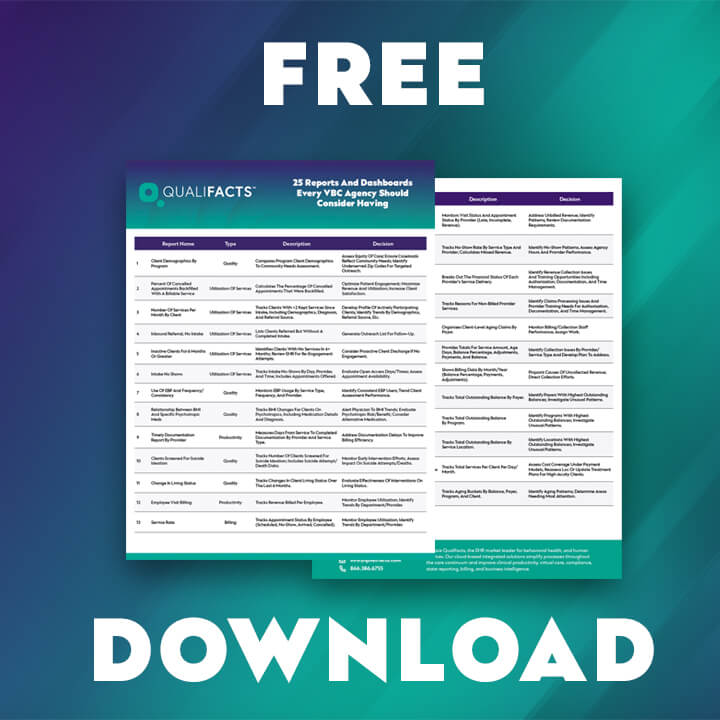In behavioral healthcare, accurate and timely documentation is paramount for effective treatment and compliance. Progress notes and process notes are two essential components of clinical documentation that help providers treat clients and meet reporting and billing requirements. Although they sound similar, they serve distinct purposes.
Understanding the differences between progress vs process notes is essential for behavioral healthcare providers. By creating comprehensive and informative records, providers can effectively communicate with other healthcare professionals, ensure regulatory compliance, and ultimately improve patient outcomes.
Progress Notes: A Treatment Roadmap
Progress notes serve as an official comprehensive roadmap, charting a client’s treatment journey. Progress notes provide a detailed, factual overview of the therapeutic process, documenting interventions, client responses, and any adjustments made to treatment plans. As these notes are required for billing purposes, many practices adhere to specific styles of progress notes such as DAP, SOAP, or BIRP.
“With Qualifacts, I’m able to pull up any client information I need. I often reference it to see who is part of the treatment team and if I need to get in contact with family members.” Jatara Mason, Discharge After-Care Planner at Middle Flint Health & Wellness
Key Elements of Progress Notes
- Presenting problems and symptoms: A clear description of the client’s concerns and presenting issues.
- New treatment plan and goals: A detailed outline of the agreed-upon treatment plan and specific, measurable goals.
- Interventions provided: A record of the therapeutic techniques, modalities, and interventions utilized during the session.
- Client’s response to treatment: Observations and assessments of the client’s progress, including any positive changes, challenges, or setbacks.
- Changes in treatment plan: Documentation of any modifications or adjustments made based on the client’s progress and needs.
By capturing these key elements, progress notes provide a valuable tool for tracking treatment effectiveness and ensuring compliance with insurance and regulatory requirements.
Process Notes: A Detailed Diary of Therapeutic Interactions
Process notes, also called psychotherapy notes, are detailed comments about therapeutic interactions with the client and are completely private. Unlike progress notes, process notes are kept separate from the client’s medical records, and they should not contain any health information such as medications, specific treatment outcomes, or medical test results. These notes are for the benefit of the provider alone and contain personal evaluations and questions that help them better treat their client over time.
It is important to remember that while these notes are not intended for clients to see, they are still protected under HIPAA, and they require a client’s consent to be shared, even with other care team providers.
“Having the information when I need it is the most important thing. It’s been so helpful having Credible because I can quickly get the information I need, find the history I need about the client we’re trying to see, and do the best services we can to help them in that moment of need.” Amy Pereira Clevenger, Director of Crisis Response and Stabilization at Compass Health
Key Elements of Process Notes
- Questions for the client: Thought-provoking inquiries the clinician wishes to ask the client to delve deeper into their thoughts, feelings, and experiences.
- The provider’s personal thoughts: Reflections, insights, and hypotheses about the client’s progress and therapeutic journey.
- Considerations for future sessions: Planning and preparation for upcoming sessions, including potential goals, interventions, or topics to address.
Process notes are invaluable for documenting individual dynamics, identifying emerging trends, and refining interactions to optimize outcomes for each client.
How Can AI-Assisted Progress and Process Note-Writing Impact Your Practice?
In today’s fast-paced healthcare environment, streamlining documentation processes is crucial. The volume and complexity of clinical notes have increased significantly over the years, placing a heavy burden on providers. AI-assisted tools have emerged as a powerful solution to address this challenge. By leveraging the power of AI, providers can simplify their documentation processes, improve the quality of care, and enhance the overall patient experience.
Optimize Workflows with AI
AI-assisted tools can revolutionize your healthcare practice when integrated with your electronic health record (EHR) system. By leveraging the capabilities of AI, you can:
- Simplify workflows through automation of routine tasks.
- Generate accurate clinical notes automatically.
- Extract relevant information from unstructured data sources effortlessly.
- Receive real-time guidance for compliant documentation.
Enhance Client Relationships
- More personalized care: By focusing on therapeutic interactions rather than documentation, providers can develop stronger relationships with their clients and offer more personalized care.
- Improved client satisfaction: Clients feel more valued and satisfied when their providers can dedicate undivided attention to their needs.
- Increased trust: When providers build strong relationships with their clients, it can lead to increased trust and confidence in the care they receive, boosting the effectiveness of their treatment.
Improve Work-Life Balance
- Reduce burnout: By automating note generation, providers can significantly reduce the time spent on administrative tasks.
- Prevent excess work from being taken home: With automation tools, providers can complete documentation tasks during the workday, reducing the need to take work home that would disrupt personal time.
- Reduced turnover: With a better work-life balance, providers are more likely to stay in their job position, helping ensure a stable workforce, leading to improved continuity of care for clients.
- Progress and Process Notes: Simplifying Documentation, Enhancing Care
Progress and Process Notes: Simplifying Documentation, Enhancing Care
Efficient documentation is essential for treatment, billing, and auditing purposes. Qualifacts iQ, our AI tool, offers a comprehensive solution that can help providers save time, improve accuracy, and enhance client care. This tool sits unobtrusively beside clinicians within their Qualifacts EHR as they work to significantly increase efficiency, reduce stress, and improve focus on serving clients. Qualifacts iQ can automatically convert transcripts of client sessions into properly formatted therapy notes (e.g. DAP, SOAP, BIRP, Progress), allowing staff to be more present with the people they serve.
“Honestly I am pretty blown away. The notes are way better than mine… and I think I write pretty good notes!” Early Adopter Provider of Qualifacts iQ
When progress and process notes are used strategically, they help provide a comprehensive roadmap for treatment, a detailed diary of therapeutic interactions, and a valuable tool for tracking client outcomes.
“We are looking at where clinicians are spending their time, knowing that they’re overworked, and looking at how we can reduce the workload utilizing technology. How can you make your lives easier every day? How can we make things more effortless?” Josh Schoeller, CEO of Qualifacts
Ready to optimize your documentation process and elevate client care? Discover how Qualifacts iQ can modernize your practice.




